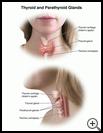
Hypothyroidism (Low Thyroid Level): Brief Version
________________________________________________________________________
KEY POINTS
- You have hypothyroidism when your thyroid gland does not make enough thyroid hormone. Thyroid hormones are chemicals that control the way your body turns the food you eat into energy. They also control body functions like temperature, heart rate, and appetite.
- Treatment may include hormone medicine. You will likely need to take your pills every day for the rest of your life.
- Follow the full course of treatment prescribed by your healthcare provider. Don’t stop taking your medicine or change the way you take it unless your provider tells you to.
________________________________________________________________________
What is hypothyroidism?
You have hypothyroidism when your thyroid gland does not make enough thyroid hormone. Your thyroid gland is in the lower front of your neck. Thyroid hormones are chemicals that control the way your body turns the food you eat into energy. They also control body functions like temperature, heart rate, and appetite.
What are the symptoms?
Your symptoms may slowly get worse over time. You may:
- Feel tired
- Be depressed
- Feel weak
- Be constipated
- Gain weight
- Feel cold a lot of the time when everyone else is warm
You may also have:
- Swollen eyelids
- Slow heart rate
- Coarse, dry hair or brittle nails
- Thick, dry skin
- Heavy and long menstrual periods
How is it treated?
Your healthcare provider will prescribe medicine to take the place of the thyroid hormone your body is not making. After you take the hormone pills for about a week, you will feel better. Your healthcare provider will need to check the thyroid hormone level in your blood often until you are taking the right amount for you.
You will likely need to take your pills every day for the rest of your life.
How can I take care of myself?
Follow your healthcare provider’s advice. Don’t stop taking your medicine or change the way you take it unless your provider tells you to.
You will need to have blood tests to check your thyroid hormone level for the rest of your life. The tests can help make sure you are getting the right amount of medicine.
Ask your healthcare provider:
- How long it will take to get better
- What things you should avoid
- How to take care of yourself at home
- What problems you should watch for and what to do if you have them
Make sure you know when you should come back for a checkup and blood tests.

